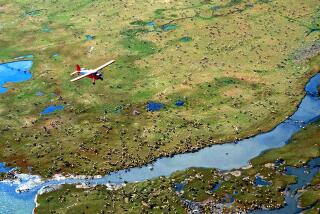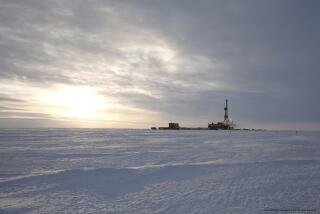Oil Drips With Money for Alaska
ANCHORAGE — Who wants to drill for oil in the far north of Alaska? Alaskans do. And do they ever.
More than the oil companies themselves, more than labor unions, more even than George W. Bush, Alaskans are desperate to get some fresh crude flowing out of the wilderness here. That’s because there is a threat on the horizon. Doom is settling in like ice fog. The bears are restless in their dens. Without new oil, goodness, Alaskans might be asked to pay taxes.
For a generation now, Alaskans have been living high off public lands and the royalties from free-flowing petroleum. Instead of having to pay state taxes, Alaskans get a juicy cash kickback every year from their government. But the big North Slope oil fields are slowly drying up.
So, Alaska has dipped into its shrinking state treasury for money to mount the mother of all lobbying campaigns: nearly $5 million to try to convince other Americans and Congress that it’s in the nation’s best interests to open the Arctic National Wildlife Refuge to oil drilling so that Alaskans won’t have to shoulder the yoke and actually pay for their schools and hospitals themselves.
For pure self-interest, Alaska beats even Enron in trying to shape government policy. In the last year, the state spent $3.85 million in its Arctic refuge drilling campaign and appropriated another $1 million last week.
By comparison, Enron spent $2.1 million lobbying in 2000 and $1.9 million the year before, according to the Center for Responsive Politics.
I have been kicking around, writing about, playing and working in Alaska on and off for a dozen years now. I love this state and its people, truly.
I also love to pull the fig leaf off their silly myths once in awhile, even though they roar like angry sow bears every time.
For instance, you’ll hear plenty about national energy independence in the debate over the Arctic refuge. But the real fight is Alaska’s fight for money.
National energy independence? The last time we heard that argument was when federal lands in Prudhoe Bay, west of the refuge, were opened for drilling. Back then, Americans were promised that North Slope crude would lead the country to self-sufficiency.
Funny, but for the benefit of Alaskans who wanted a better price for their oil, Congress later said never mind and allowed this oil to be sold to Asia. Today the U.S. imports a larger share of its oil than ever before.
Funny, too, but if you look close, you don’t see much in the way of oil company lobbying to drill in the disputed coastal section of the Arctic National Wildlife Refuge. To the disappointment of many Alaskans, the giant oil companies are preoccupied elsewhere--in Russia, in Africa, in Latin America, in the Gulf of Mexico and in Central Asia.
So the state has had to shoulder the argument itself, hand in hand with the president.
Why? Well, on the frontier, life has been cushy for a generation now. At least as far as government goes. Alaskans--those hardy and self-reliant frontiersmen--get an annual “dividend” from the Juneau government: the earnings off a $21-billion “permanent fund” that is the citizenry’s share of oil revenues over the years.
Last year, the payout was $1,963.86 per person, or $7,855 for a family of four. On top of that, oil pays for 84% of state government, meaning no income or sales taxes.
On the federal front, government also favors Alaskans. For every $1 they pay in U.S. taxes, they receive $1.68 back--to provide such cushy services as subsidized airline service to air-freight soda pop to remote villages. This per-capita payout is twice the 86 cents that Californians get back for each $1 they pay in federal taxes.
Not that Alaskans are grateful, of course. They adhere to the illusion of rugged individualism, which means they are second to none when it comes to complaining about government and taxes.
And right now, the complaints have reached fever pitch. Like many states, Alaska faces a budget deficit: $1 billion. The governor has proposed an income tax. Other politicians are arguing for a sales tax on the grounds that at least some of the burden would then be sloughed off on tourists rather than to residents. Some state leaders have been so daring as to propose dipping into the permanent fund to pay for government.
But the best hope, at least for the long run, is more oil. So when you hear that drilling in the Arctic National Wildlife Refuge is going to help America, you’ll know exactly which part.
More to Read
Sign up for Essential California
The most important California stories and recommendations in your inbox every morning.
You may occasionally receive promotional content from the Los Angeles Times.










